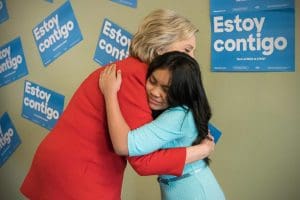The significance of Hillary Clinton's work on behalf of children
Hillary Clinton often says that she has spent her life advocating for children, women, and families. She has — but rarely do we consider what this says about her. And, more specifically, how it crushes so many pernicious narratives about her. Does someone who is, as she is so frequently said to be, ruthlessly ambitious, […]

And, more specifically, how it crushes so many pernicious narratives about her.
Does someone who is, as she is so frequently said to be, ruthlessly ambitious, who will stop at nothing to seize ever more power, dedicate her life to children, who cannot vote? Who cannot give her money? Who have no cultural power to grant to her?
Part of the reason that there are so few politicians who center their work around children is for this very reason. Children are a special interest group with nothing immediate to offer in exchange for advocacy on their behalf.
When children are invoked in political discourse, it is rarely as their own rights-bearing citizens with diverse needs, but generally as dehumanized political justification for harming a marginalized population from whom they need to be “saved” or “protected.” Pro-choice activists, LGBTx people, atheists, etc.
They are often rhetorical tools to most politicians, rather than a demographic in need of passionate advocates.
But not to Hillary Clinton.
Clinton’s advocacy on behalf of children goes back more than 40 years. She began her career working for The Children’s Defense Fund, an American child advocacy and research group, founded by the woman who would become her mentor — Marian Wright Edelman.
As First Lady of Arkansas, she chaired the Arkansas Educational Standards Committee and co-founded the Arkansas Advocates for Children and Families. She was instrumental in the passage of the State Children’s Health Insurance Program (SCHIP) during her tenure as First Lady of the United States. And these are just the highlights.
In 1973, she wrote an article for the Harvard Educational Review in which she laid out a radically compassionate vision of children’s rights, which would still be controversial among many people to this day:
Child citizens, although their needs and interests may be greater than those of adults, have far fewer legal rights (and duties). Indeed, the special needs and interests which distinguish them from adults have served as the basis for not granting them rights and duties, and for entrusting enforcement of the few rights they have to institutional decision-makers.
Clinton views children as rights-bearing citizens with a unique set of needs, thus requiring specialized advocacy.
But among those rights is not the right to vote. They are neither a wealthy nor influential constituency.
She advocates for children, and pursues policy that improves their lives, because it is the right thing to do.
I am not sure even most adults understand how special that really is.
Recommended

Biden on abortion rights: President expects to give speech Tuesday on new Florida 6-week ban
‘Having the president of the United States speaking out loud and with confidence about abortion access is a great thing’
By Mitch Perry, Florida Phoenix - April 22, 2024
Biden calls for expanded child tax credit, taxes on wealthy in $7.2 trillion budget plan
President Joe Biden released his budget request for the upcoming fiscal year Monday, calling on Congress to stick to the spending agreement brokered last year and to revamp tax laws so that the “wealthy pay their fair share.”
By Jennifer Shutt, States Newsroom - March 11, 2024
Biden rallies Democrats in Las Vegas: ‘Imagine the nightmare’ if Trump reelected
With a primary win all but inevitable, President Joe Biden used his Sunday appearance in Las Vegas’s Historic Westside to rally his most vocal supporters in a battleground state that delivered for him four years ago.
By April Corbin Girnus, Nevada Current - February 05, 2024







































































